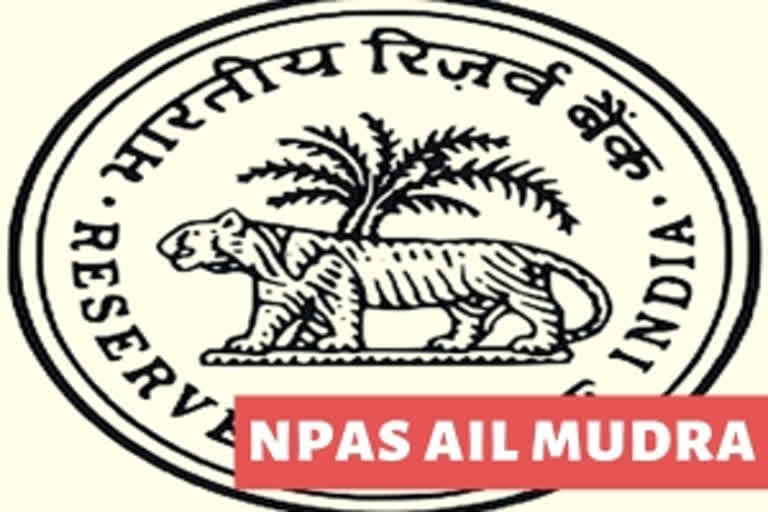Hyderabad (Telangana): In spite of Pradhan Manthri Mudra Yojana (PMMY) launched by Modi Government in 2015 has achieved set targets, an increase of non-performing assets (NPAs) due to unpaid loans has been caused of concern for banking sector.
It stresses the need for banks to review the loan procedures as the deputy Governor of the Reserve Bank of India MK Jain has warned against an increase in unpaid loans offered through MUDRA (Microsoft Finance Development and Refinance Agency Limited) scheme.
His observation gets significance that the bankers should assess properly the loan repayment capacity so that the traders getting loans. Also in the past RBI former Governors have expressed similar concerns at the increase in non-payment of loans taken.
Former RBI Governor Raghuram Rajan has warned last year that increase of loans to micro, small and medium traders may lead to a crisis in the banking sector. It led to a debate in government and in the banking sector. In four and half years of Mudra scheme, which aims to offer Rs 10 lakh maximum loans to MSMEs without any assurance, more than Rs 10 lakh crores were offered to about 21 crore beneficiaries.
Also read: India and Foreign Direct Investment: Changed Focus Necessary
As a result, crores of micro and small traders grew financially as they are making better business. However, non-payment of loans was put at Rs 5067 cr in 2016-17 financial year, Rs 7277 cr in 2017-18 and Rs 16,481 cr in 2018-19 and may rise further in this fiscal. The problem of unpaid loans is more in PSBs and Banking major SBI tops in the list followed by Punjab National Bank, Bank of India, Canara Bank and Syndicate Bank. The ratio of unpaid loans rise to 2.58 per cent in 2017-18 and 2.68 in 2018-19 fiscal as they grow with loans.
MUDRA loans list...
After the adverse effect of the scrapping of big notes, micro traders faced another jolt of GST (Goods and Services Tax) in 2017. As a result, crores of traders lost their employment while the ratio of unpaid loans was also increased. Many small and new traders Including those obtained loans below Rs 50000 under Shishu scheme, failed to sustain in businesses as they could not follow changing market trends due to lack of skills.
Small traders of readymade clothes, bakeries, tiffin centres, tea stalls and others quit the business as they failed to face competition. In the manufacturing sector, small traders though repay loans with financial discipline failed to withstand stiff competition - domestic and international as imported products from China, Vietnam and South Korea sell at cheaper prices. Micro and small traders failed to do business on expected lines of their products.
Though the government collects anti-dumping duty on imported goods, Illegal entry of the same into our country proves costly in manufacturing sector leading to the closure of some small businesses as they failed to follow marketing trends.
To reach targets and to compete, some banks skip norms to give loans, do not review and monitor before and after disbursal and PSBs failing to extend cooperation to beneficiaries.
Also read: 'The de-railed Indian Railways'
Immediate steps
The Reserve Bank of India and other banks have to take immediate steps to check the increase of unpaid loans and need to adopt changes in giving loans accordingly. They have to increase loans amount from Rs 10 to Rs 20 lakh for micro, small and medium traders and Entrepreneurs under Shashi, Kishore and Tarun schemes as recommended by SK Sinha committee.
The RBI cannot refrain from giving loans to micro traders in the wake of the increasing amount of unpaid loans. It has to give fresh guidelines, free hand to PSBs to collect loans
offered on a war footing, steps to reduce piling of NPAs and give loans with strategy.
While being busy with merger plans, the banks also face challenges of unpaid loans. They have to focus on the recovery of unpaid loans or else loans offered to MSMEs may become NPAs in future. In the wake of slump effect stalls efforts to collect loans, PSBs have to act strategically. They need to be cautious on problematic loans before they become unpaid loans.
Banks have to prepare to implement single time loans re-establishment scheme introduced by RBI in January last to help MSMEs. Government, RBI, PSBs and financial institutions have to make collective efforts to help sustain MSMES s which are key for the national economy. Instead of big targets, the government has to give free hand to banks to give MUDRA loans at the same time.
It is time to see that 5.77 cr MSMEs which offered employment to 12 cr people, make better business also steps to check the increase of unpaid loans for national economic development. PSBs negligence While PSBs negligence in collecting MUDRA loans caused a problem every year. Other banks, PBS and financial institutions performed well in loan recovery while the percentage of unpaid loans is at a low level. PCBs top in giving MUDRA loans, played a key role to offer loans in previous governments and now doing so in implementing schemes.
Due to the slump growth rate in key sectors, MSMEs also impacts traders took MUDRA loans. Loan evading culture is on the rise in the wake of recent publicity on government loans, as also situation of unpaid loans is alarming.
Also read: Bank cards with new chip proving dangerous



